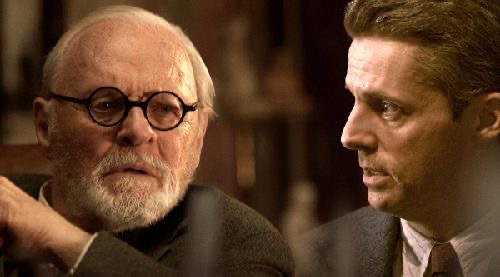One of the more reliable themes in history and philosophy is man’s acknowledgement of and desired independence from an omnipotent God. In “Freud’s Last Session” (Sony Pictures Classics) Sir Anthony Hopkins plays the hectoring, harrumphing atheist, Sigmund Freud, battling mandibular cancer while coming to terms with his own mortality.
Set in 1930’s London on the eve of the Second World War, Freud arranges to meet University of Oxford Professor and world renown Christian author, C. S. Lewis (Matthew Goode). No one knows if the meeting actually took place – Dr. Arman Nicholi took the documented visit of a much younger Oxford professor to Freud’s home shortly before his death as an opportunity to create a fictionalized debate between the two protagonists. An adaptation of Mark St. Germain’s play of the same name, director Matt Brown’s film is an intellectual affair of opposing worldviews, extracted, distilled, and used to animate two of the most influential titans of the twentieth century. In the end, despite superlative performances, this two-hander fails to provide the level of crackling dialogue Hopkins’ achieves in “The Two Popes.” Sadly, the material doesn’t quite transcend its inherent staginess. Mostly, “Freud’s Last Session” is an opportunity for Hopkins to chew the scenery – which he does masterfully.
The surest indication of sanity is the ability to change your mind.
Most importantly, the film offers a view of both men as flawed individuals. One seeking to conform his soul to reality, the other wishing to conform reality to his desires. Neither are wholly successful. Freud insists that religion is a psychological crutch created by weak minds to cope with a cruel world. Conversely, Lewis reasons, if God can be conjured up to satisfy a psychological desire, could God’s existence not be dismissed by the same psychological rationale? In other words, wishing for something does not prove that what is desired exists, but neither does it prove that what is desired does not exist. Lewis defends faith in an omniscient, omnipotent God, and yet that faith proves insufficient in mitigating the irrational fears and debilitating effects of PTSD. On the other-hand, Freud publicly espouses an indulgent view of sexuality, however this liberty is, apparently, not extended to his daughter, and professional heir, Anna (Liv Lisa Fries). An accomplished psychologist in her own right, Anna draws the ire of a forbidding father by her longstanding romance with colleague Dorothy Burlingham (Jodi Balfour), implicitly pointing to a hypocrisy all too common in the private lives of ideological demagogues.

This back-and-forth continues with discussions of God, father figures (both spiritual and biological) and, of course, sex. Flashbacks and dream sequences visually punctuate the conversation, as do scenes depicting Freud’s ever-increasing chemical dependency – an unholy concoction of alcohol and opioids. Indeed, the ultimate irony encircling the father of psychoanalysis is his failure to recognize the spiritual symbolism of his own reality. Namely, that a lifetime of morally malignant orations formed by his own blasphemous lips has defiled the very flesh that produced them. (Notably, this fate is one shared by another more recent and equally vocal atheist, the late Christopher Hitchens.) Matthew 5:11 says, “”It is not what enters the mouth that defiles the person, but what comes out of the mouth, this defiles the person.”“ Indeed. In the end, Freud’s denial is so great, his hubris so inflated that they render him incapable of processing – even momentarily – Lewis’ notion that pain is God’s megaphone for arresting our attention. For Freud (and every nonbeliever), suffering has no greater purpose, no redeeming value. “We are all cowards before death,” he portends. Is it any wonder, then, that the end of Freud’s life was marked by desperation and an all-consuming but futile attempt to sustain intoxication, thus extinguishing the voice God?
What, some moviegoers may wonder, was the point of the whole exercise? On the upside, the two principals maintain an air of mutual respect and enjoy some humorous moments together. One such moment involved Freud using an expression which acknowledged “God” – a slip of the tongue one might call “Freudian.” Overall, this is unusually intelligent fare, though some may find it a bit stodgy. The film contains mature themes, including lesbianism and suicide, a combat sequence with some gore, brief sensuality, and at least one use of profanity. The Motion Picture Association rating is PG-13 — parents strongly cautioned. Some material may be inappropriate for children under 13.
